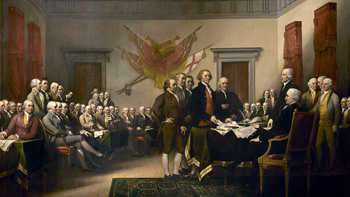The American Revolutionary War, a seminal event in the history of the United States, was more than just a war for independence from British rule; it was a battle for the very soul and future of a nation. Spanning from 1775 to 1783, this conflict not only resulted in the birth of a new nation but also set forth ideals and principles that would shape the democratic world for centuries to come. This article explores the key events, figures, and repercussions of this pivotal period in American history.
The Roots of Revolution
The seeds of the American Revolution were sown in the decades leading up to the war. British colonial policies, particularly taxation without representation, deeply angered the American colonists. The Stamp Act of 1765 and the Townshend Acts of 1767, which imposed taxes on everyday items, sparked widespread protest and the rallying cry of “no taxation without representation.” These policies, combined with the Boston Massacre of 1770 and the Boston Tea Party of 1773, set the stage for a full-scale rebellion.
Outbreak of War and the Struggle for Independence
The war officially began on April 19, 1775, with the battles of Lexington and Concord. These skirmishes marked the first armed conflict between the British troops and the colonial militia, signaling the start of a long and arduous struggle for independence. The Continental Congress, representing the 13 colonies, appointed George Washington as the commander-in-chief of the Continental Army. Despite facing a formidable British military, the colonists were driven by a fierce desire for freedom and self-governance.
Turning Points of the War
Key battles played a pivotal role in the outcome of the war. The Battle of Saratoga in 1777 was a significant turning point, resulting in a major defeat for the British and convincing France to enter the war as an ally to the American colonies. This Franco-American alliance brought much-needed resources, troops, and naval support to the colonial forces. Another crucial moment was the winter at Valley Forge in 1777-1778, where despite severe hardships, the Continental Army emerged stronger and more unified under Washington's leadership.
The Role of International Support
International support, particularly from France, was instrumental in the American victory. French military and financial aid, led by figures like the Marquis de Lafayette, played a crucial role in sustaining the colonial war effort. Additionally, Spain and the Dutch Republic also provided support, creating broader geopolitical implications and turning the conflict into a more global war.
The Path to Victory and Treaty of Paris
The final phase of the war was marked by the American victory at the Battle of Yorktown in 1781. British General Cornwallis's surrender to George Washington was a decisive moment, leading to the end of major combat operations. The Treaty of Paris, signed in 1783, formally ended the war and recognized the sovereignty of the United States. This treaty marked a new era not only for America but for the world, as it represented the first successful colonial fight for independence against a European power.
The Impact of the Revolutionary War
The American Revolutionary War had far-reaching effects. Domestically, it led to the formation of a new government, based on the principles of liberty and democracy, as articulated in the Declaration of Independence and later enshrined in the Constitution and the Bill of Rights. Internationally, it inspired other revolutionary movements worldwide, particularly in France and Latin America. The values and ideals of the Revolution, such as self-rule and the rights of individuals, continued to inspire democratic movements across the globe.
Holidays Commemorating the American Revolutionary War
The American Revolutionary War has given rise to several significant holidays that are celebrated in the United States, the most notable being Independence Day on July 4th. This holiday commemorates the adoption of the Declaration of Independence on July 4, 1776, marking the formal separation of the thirteen colonies from Great Britain. It is celebrated with fireworks, parades, and various patriotic displays, serving as a symbol of American freedom and the struggle for independence. Another related observance is Patriots' Day, recognized in some states, which commemorates the battles of Lexington and Concord, the first conflicts of the Revolutionary War. These holidays not only celebrate historical milestones but also serve to honor the ideals of liberty and democracy that emerged from this pivotal period in American history.
In essence, the American Revolutionary War was more than a historical event; it was a transformational period that reshaped political and social landscapes. It challenged established norms, introduced revolutionary ideals, and marked the birth of a nation founded on principles of freedom, equality, and democracy. Its legacy continues to influence global politics and thought, underscoring the enduring power of the ideals it championed.
